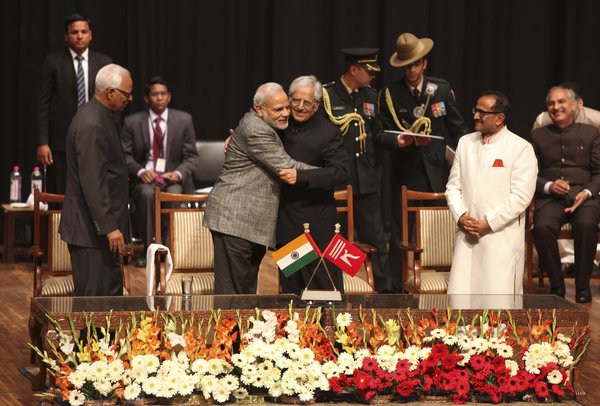
Prime Minister Narendra Modi of India, center left, embraced Mufti Mohammad Sayeed, who leads the Jammu and Kashmir People’s Democratic Party, at his swearing-in ceremony in Jammu. CreditChanni Anand/Associated Press
Amid heavy security, Prime Minister Narendra Modi of India flew to Jammu, the winter capital of the state, to attend the swearing-in ceremony on Sunday of Mufti Mohammad Sayeed, 79, who leads the Jammu and Kashmir People’s Democratic Party. The two men embraced, a hug that few observers would have thought possible as little as a year ago.
“History has given us a big opportunity, and we want to make this alliance the turning point for Kashmir,” Mr. Sayeed said in his first news conference as chief minister.
Elections held in November and December yielded record turnouts, including in districts where boycotts against Indian rule left polling booths nearly deserted. Part of the reason for the surge in voter participation was a desire by those with separatist leanings to defeat Mr. Modi’s Bharatiya Janata Party, whose leaders predicted that it would win an outright majority in the state’s 87-seat legislature.
In the end, Bharatiya Janata won 25 seats, all in Hindu-dominated districts. Mr. Sayeed’s party won 28, the most in the assembly.
Negotiations between the two parties about forming a government were prolonged, chiefly because the two hold diametrically opposing views on crucial questions.
These include whether to repeal a law that gives Indian soldiers broad immunity from prosecution, even in cases involving the rape and murder of Kashmiri citizens, and whether to keep a constitutional provision, which the B.J.P. wants to scrap, that provides special privileges to Kashmir.
In a carefully worded alliance agenda, the two sides acknowledged their continuing differences.
Mr. Sayeed said his government’s top priority was to bring lasting peace to the region.
A violent insurgency that began in 1989 and cost tens of thousands of lives has largely dissipated, although insurgents based in the region of Kashmir controlled by Pakistan still stage coordinated assaults on occasion and separatist sentiment remains strong. India and Pakistan both claim the entirety of Kashmir and have fought two wars over it.
Syed Ali Geelani, a separatist leader, said that Mr. Sayeed wants to legitimize Indian rule. “They want to convince the freedom-loving people, as well as Pakistan, to accept the status quo,” something to which Kashmiris would never agree, he said.
Rekha Choudhary, a professor of political science at Jammu University, said that although the two political parties are poles apart in their ideologies, the alliance could be productive.
“Their coming together denotes that both the parties have moved away from their stated positions on contentious issues, which can open up new vistas for the political resolution of Kashmir,” Ms. Choudhary said.